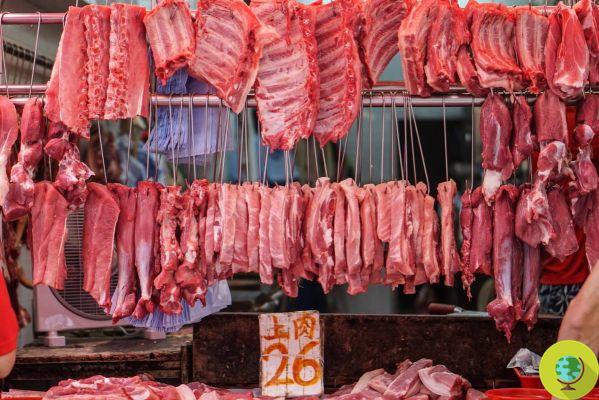
In Belgian markets, meat from protected African wild animals is illegally sold. New food scandal
He is about to end up run over, his mother saves himThe European Union prohibits the import of meat unless specifically authorized and certified as admitted for import. However, a new study reports that passengers from West and Central African countries illegally import large quantities of meat, including that of wild animals, in Europe through international airports.
African bushmeat is a luxury market organized in Europe, especially in Brussels, in Belgium. Not just in China. A real carnage is taking place even a stone's throw from us, with wild animals sold illegally at very high prices. According to what was revealed by the study conducted by the Royal Belgian Institute of Natural Sciences, which revealed the presence of various protected African species among the cuts of meat sold in the various markets of Brussels.
In November and December 2017, the study authors purchased bushmeat from 9 African grocery stores in the 'Matongé' neighborhood of Brussels. The shops were selected because they displayed (fresh) African food products, the shopkeepers were of African descent and spoke Swahili or Lingala. In three of them, wild animal meat was on sale. For two months, the researchers bought 12 pieces of meat. In May 2018, three more samples were purchased in two African grocery stores in “Matongé” by journalists from the Belgian public television stations RTBF.
Inquiries among Central and West African expatriates living in Belgium and who frequently travel to their home countries indicated that game consumption was culturally driven by a desire to remain linked to the countries of origin. But DNA analyzes of 15 pieces of bushmeat revealed that they belonged to various mammal species, some of which are protected and listed in CITES.
Bushmeat was not displayed in the African food shops visited. After specifically asking for availability, six sellers said they did not sell but others after some insistence admitted to having it. It was stored in the back of the shop or could be picked up the next day. All the meat has been declared by the vendors as originating in the Democratic Republic of the Congor. The price was on average 40 € / kg but it ranged from 31 and 62 € / kg.
Three species in particular were sold in Brussels: the Congo-nosed vervet, the Brazza's vervet and a species of small antelope called the blue duiker.
The international bushmeat trade is illegal. The European Union prohibits the importation of meat (products) by passengers, unless it meets the certification requirements for commercial shipments and is presented at the EU border control post with the correct documentation. Many wildlife species can carry pathogens, and the hunting and processing of bushmeat has been linked to several disease outbreaks. For this reason, the uncontrolled importation of game can pose risks to the health of human and animal populations in the destination countries.
“There is no reliable information on the extent of the international bushmeat trade, however mounting evidence suggests that the amount of bushmeat imported into Europe is substantial. During a survey at Roissy-Charles de Gaulle airport (Paris, France) 7% of passengers inspected from West and Central African countries were carrying bushmeat, while 25% had cattle meat in their luggage. bushmeat shipments averaged over 20 kg (up to 51 kg), compared to 4 kg for livestock. This and other studies indicate that bushmeat is not only imported for personal use, but also to supply an illegal African bushmeat market in Europe, ”the study reported.
But not only. Illegal international bushmeat trade contributes toover-exploitation of vulnerable and protected species. A number of studies at European airports have reported the illegal importation of species listed as Vulnerable or Critically Endangered by the International Union for Conservation of Nature (IUCN) and protected by the Convention on International Trade in Endangered Species of Wild Fauna and Flora. extinction (CITES).
A story that arouses a sensation also in light of the fact that the Covid epidemic seems to have exploded right among the damp markets. We have not learned anything, not even when we have paid the price of our wicked choices on our own skin.
Sources of reference: Biodiversity and Conservation
READ also:
- Wet Chinese markets are still open: nine months after the Covid-19 pandemic, nothing has changed
- So Chinese fur producers are profiting from closing mink farms in Denmark (and around the world)
- Undercover images show the wet markets of Indonesia and Thailand still open, despite everything ...


























